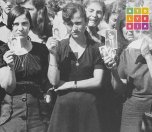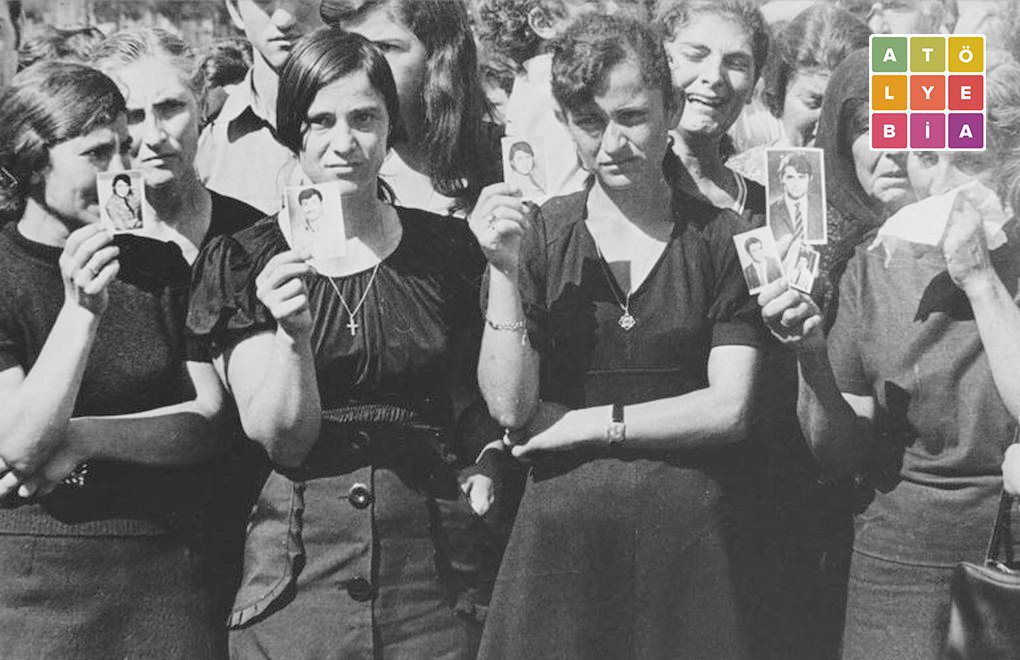Click to read the article in Turkish
"There is a single Rum (Greek) family left in Ortaköy", says Ortaköy Rum Foundation Chair Strato Dolçinyadis. In fact, this sentence summarizes the situation of minorities in İstanbul. The Wealth Tax of the 1940s, the pogrom of September 6/7 in 1955, exiles in 1964, rights violations going hand in hand with violence, discrimination, "othering"... All of these factors have led and are still leading the minorities such as Jews, Rums and Armenians to leave the lands where they were born. As for the ones who have stayed, they are pushed to "live in a dovish disquiet", as previously put by late journalist Hrant Dink, who was massacred in 2007.
While they used to live in several districts of İstanbul, minorities mostly live in Kadıköy, Şişli, Bakırköy, Taksim and Beşiktaş now. We start walking along the streets of Beşiktaş, seeking after the places where Jewish, Armenian and Rum people meet today and after the memory of recent past...
Neighborliness that has disappeared with prejudices...
Passing along the Greek Orthodox Church of Panayia next to Balık Pazarı, we visit the Surp Asdvadzadzin Armenian Church on the upper street.
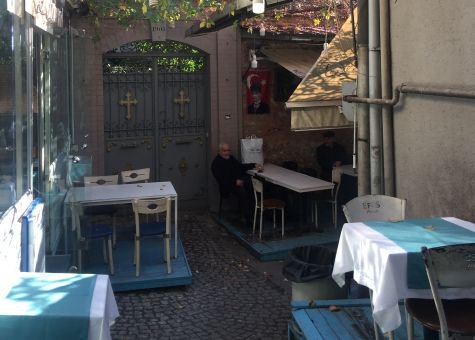
Greek Orthodox Church of Panayia next to Balık Pazarı
When we enter the garden of the church, we see the busts of Garabet and Sarkis Balyan from the Armenian family of Balyan, who were the architects of precious works such as the Dolmabahçe Palace of İstanbul. Our next stop is "Caffe Eden", a kosher restaurant in Ortaköy.
Opened four years ago, Caffe Eden has been offering food made of meat slaughtered according to the religious traditions of Jews. When we talk to Moris, who is there to inspect the restaurant on behalf of the community, we learn that the Jewish community of this street previously known as Jewish Bazaar has now moved to Ulus, Göktürk and İstinye. There is a single Jewish school in İstanbul: Ulus Private Jewish High School.
When we ask them how they observe their cultural and linguistic practices, they answer, "Children learn four languages at school. We do not speak Hebrew at home, but it is one of the languages taught at school."
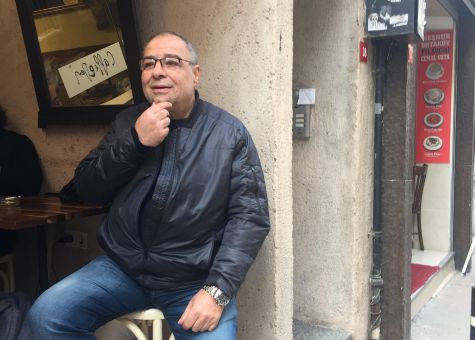
Varujan Taşçıoğlu at Kosher Restaurant Caffe Eden in Ortaköy
Another guest of Caffe Eden is Varujan Taşçıoğlu, who used to be in jewelry business. He tells Moris jokingly, "I am now working as a driver in the Jewish community." Born and raised in Beşiktaş, Taşçıoğlu also frequents the tribunes of Beşiktaş football club. Taking a trip down the memory lane together, two friends have been yearning for their neighborhood relations that have now disappeared due to prejudices.
'They have gone to the US or France'
As for Talin Taşçıoğlu, who is one of the old Armenian residents of Ortaköy, Talin Taşçıoğlu says, "Almost all of my childhood friends have gone to the US or France." What about her? Even though she is subjected to sexist and discriminatory remarks both as a woman and minority, she has never thought of leaving. "This is my home", she says in a firm tone. But, when she remembers her childhood and the festivities of Medz Bahk (Great Fast) celebrated in February, a tone of longing is recognizable in her voice, just like a tone of sorrow as none of these is done anymore.
"This festival can be celebrated only in Samatya or Feriköy now, which are densely populated by Armenians", she says. She is contented that Tarkmanças Armenian School has been opened again.
Taşçıoğlu also went to Tarkmanças Armenian School, which remained closed for a long time due to declining population. The school has an important place in the education of Armenian children today.
The urgency of confronting the past...
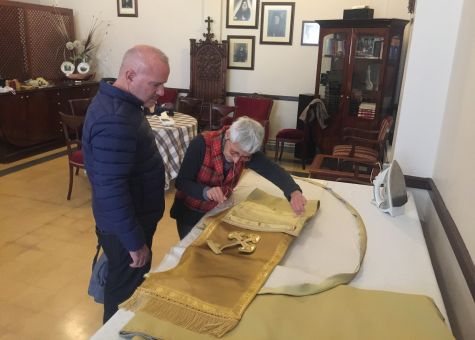
Strato Dolçinyadis is examining the church clothes at Agios Fokas Greek Orthodox Church in Ortaköy
Then, we meet Ortaköy Rum Foundation Chair Strato Dolçinyadis. He tells us that the Rum population in Ortaköy has been decreasing and Arnavutköy is the biggest center now, after Taksim. "There is a single Rum family left in Ortaköy", says Dolçinyadis. Expropriated in the 1980s, the Rum school has been returned to them as a result of their struggle at the European Court of Human Rights (ECtHR). The revenue coming from the school is now used by the Rum Foundation to help the neighborhood residents in need regardless of their religious beliefs, says Dolçinyadis.
'Varujan was the big brother of us all'
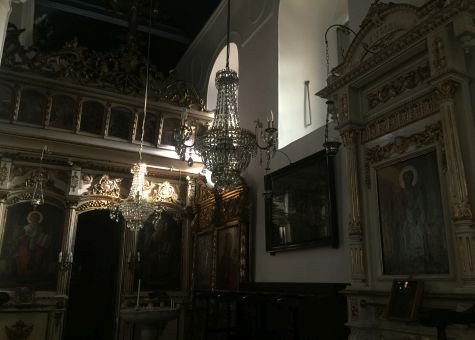
The interior of Agios Dimitrios Greek Orthodox Church in Kuruçeşme. There is also a holy spring in the church believed to heal.
We go up to the holy spring in Agios Dimitrios Church in Kuruçeşme. We are told there that people come to the spring to find healing and religious ceremonies are conducted at church on Saturday. When we leave and start to walk down the street, we now see Holy Cross Armenian Church.
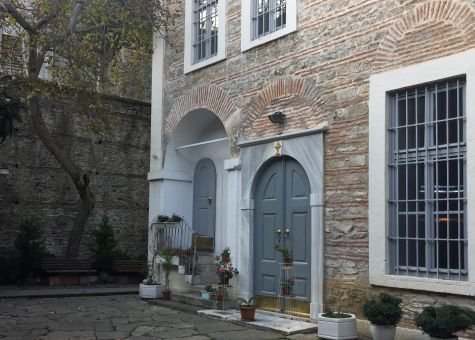
Holy Cross Armenian Church neighboring Agios Dimitrios Church
Varujan Erkan Astro Pitch just across the church gets our attention. Metin Görgün from Kuruçeşme Sports Club tribues says the following about Erkan: "Varujan Erkan was a neighbor of mine. He was the equipment provider of Kuruçeşme Football Club and the big brother of us all."
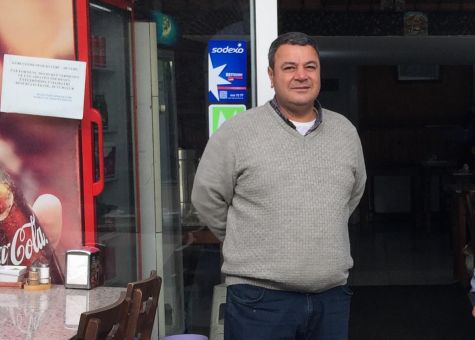
Metin Görgün from the tribunes of Kuruçeşme Sports Clubs in front of a small restaurant near Varujan Erkan Astro Pitch
The kilometers long way from Beşiktaş to Kuruçeşme is full of buildings that belong to the Rums, Armenians and Jews. However, to our dismay, these buildings are now empty as a result of policies put into action. It is not only the buildings that have turned into a ghost town, but also our cultural richness and our sense of co-existence... We now say farewell to Beşiktaş, understanding once again how urgent pluralist policies and confrontation with the past is for the future existence of minority groups. (TÖ/MB/SO/SD)




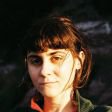
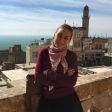
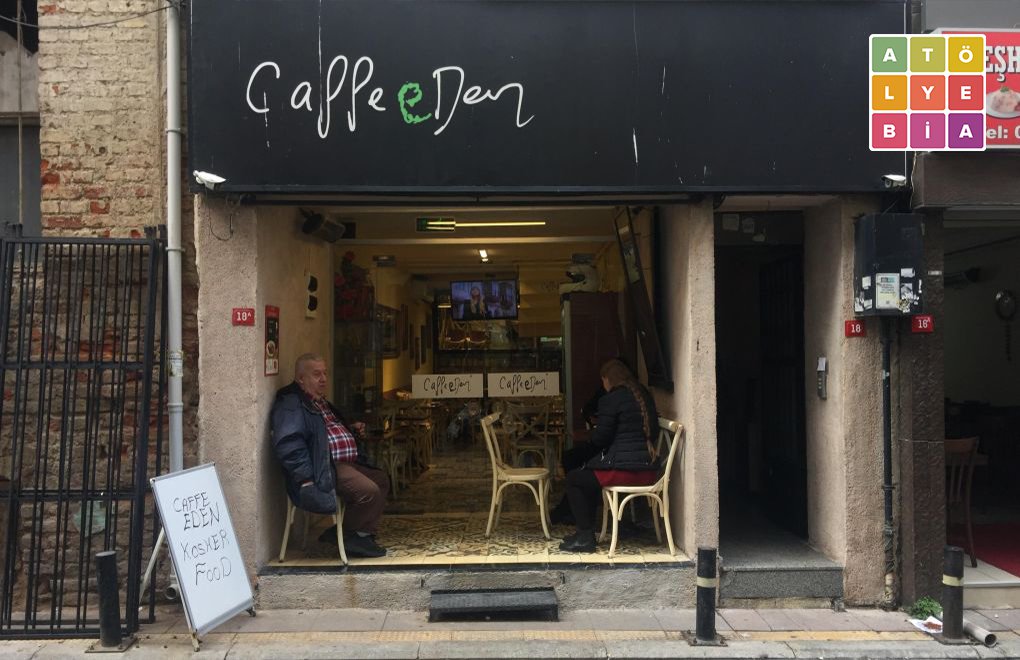

as.jpg)
